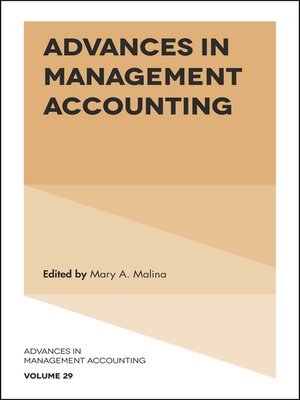Advances in Management Accounting, Volume 29
ebook ∣ Advances in Management Accounting · Advances in Management Accounting
By Mary A. Malina

Sign up to save your library
With an OverDrive account, you can save your favorite libraries for at-a-glance information about availability. Find out more about OverDrive accounts.
Find this title in Libby, the library reading app by OverDrive.



Search for a digital library with this title
Title found at these libraries:
| Library Name | Distance |
|---|---|
| Loading... |
Advances in Management Accounting (AIMA) is a publication of quality applied research in management accounting. The journal's purpose is to publish thought-provoking articles that advance knowledge in the management accounting discipline and are of interest to both academics and practitioners. The journal seeks thoughtful, well-developed articles on a variety of current topics in management accounting, broadly defined. All research methods including survey research, field tests, corporate case studies, experiments, meta-analyses, and modeling are welcome. Some speculative articles, research notes, critiques, and survey pieces will be included where appropriate.
Articles may range from purely empirical to purely theoretical, from practice-based applications to speculation on the development of new techniques and frameworks. Empirical articles must present sound research designs and well-explained execution. Theoretical arguments must present reasonable assumptions and logical development of ideas. All articles should include well-defined problems, concise presentations, and succinct conclusions that follow logically from the data.
Articles may range from purely empirical to purely theoretical, from practice-based applications to speculation on the development of new techniques and frameworks. Empirical articles must present sound research designs and well-explained execution. Theoretical arguments must present reasonable assumptions and logical development of ideas. All articles should include well-defined problems, concise presentations, and succinct conclusions that follow logically from the data.







